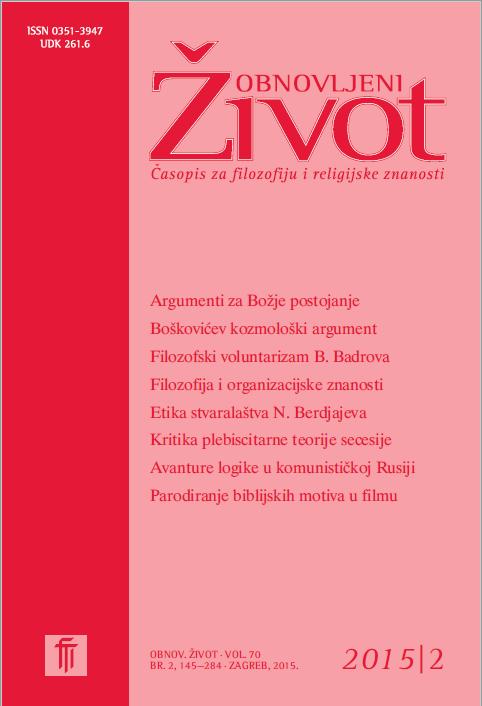The Neo–Scholasticity of Bonifac Badrov’s Philosophical Voluntarism?
Keywords:
Bonifac Badrov, will, voluntarismAbstract
Bonifac Badrov (1896–1974) is a Croatian philosopher of the neo–scholastic orientation and a professor at the Franciscan School of Theology in Sarajevo between 1934 and 1973. His books and articles have been published in his Collected Works I–III (Sarajevo — Gorica, 1997). The goal of this article is to research and present, based on his philosophical writings, his thoughts on the place, role and significance of man’s will and his wilful activity; to extract the branches of philosophy and topics wherein Badrov thematizes the question of the will and the solutions he offers and, finally, to examine whether his understanding of the role and significance of the will is closer to Thomist or Scotist teachings, or whether it develops in a singular direction. It was established that, if one were to try to classify the Franciscan Bonifac Badrov in terms of the tradition of Scotus’ voluntarism, much would remain unaccounted for (eg. Badrov’s firm stance on reason as the light which guides the will). On the other hand, a classification in terms of the tradition of Aquinas’ intellectualism would also be found wanting (eg. Badrov’s outlook on fatal reason and will which is crucial in view of activity and morality). In conclusion, it is ascertained that the ensuing centuries of scholastic and neo–scholastic philosophical tradition speak through Badrov’s thought. This tradition has examined and determined the path upon which the two greatest powers of the soul, reason and will, constitute two sides of the same coin: man’s spiritual soul.
Downloads
Published
Issue
Section
License
Jednom prihvaćeni članak obvezuje autora da ga ne smije objaviti drugdje bez dozvole uredništva, a i tada samo uz bilješku da je objavljen prvi put u Obnovljenom životu. Uredništvo će obavijestiti autora o prihvaćanju ili neprihvaćanju članka za objavljivanje.
Članci objavljeni u časopisu se, uz prikladno navođenje izvora, smiju besplatno koristiti u obrazovne i druge nekomercijalne svrhe.


